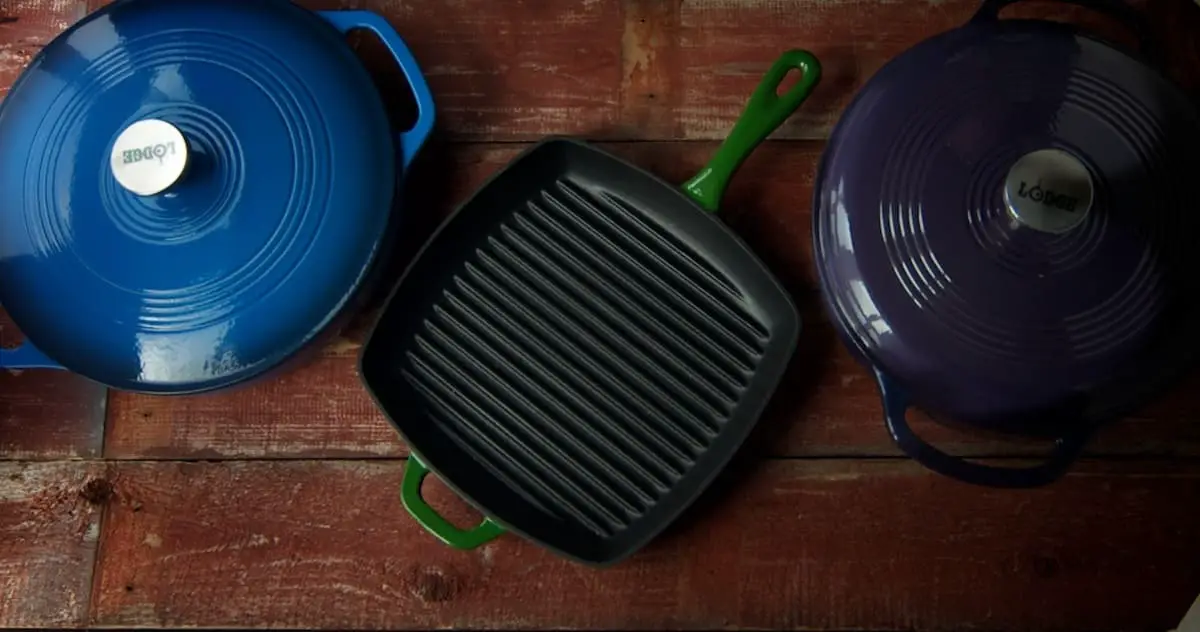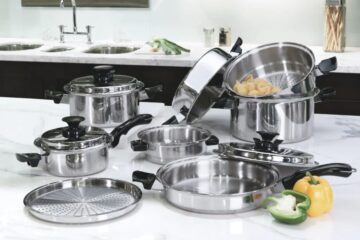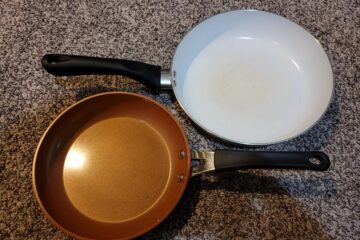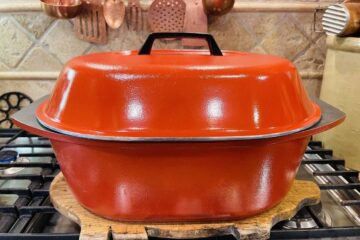Enameled cast iron cookware has been around for decades, and it’s a popular choice for many home cooks. However, there are concerns about its safety for cooking. The question is whether enameled cast iron cookware is safe for cooking, and if so, what are the benefits of using it?
Enameled cast iron cookware is made by coating cast iron with a layer of enamel, which is a type of glass. The enamel coating provides a non-stick surface and prevents the cast iron from rusting. Enameled cast iron cookware is versatile and can be used on all types of stovetops, including induction cooktops. It’s also oven-safe and can withstand high temperatures.
What is Enameled Cast Iron Cookware?
Enameled cast iron cookware is made of cast iron, which is a type of metal known for its durability and heat retention properties. It is coated with a layer of enamel, which is a type of glass that is fused to the cast iron surface. This coating gives the cookware a smooth and non-reactive surface that is easy to clean and maintain.
The enameling process involves melting glass particles onto the surface of the cast iron at high temperatures. This creates a smooth, glossy finish that is resistant to scratches and stains. The enamel coating also protects the cast iron from rust and other forms of corrosion.
Enameled cast iron cookware is available in a variety of colors and styles, making it a popular choice for home cooks and professional chefs alike. It is often used for a wide range of cooking tasks, including searing, sautéing, frying, and baking.
One of the main advantages of enameled cast iron cookware is that it does not require seasoning like traditional cast iron cookware. Seasoning involves coating the surface of the cookware with a layer of oil and heating it to create a non-stick surface. Enameled cast iron cookware, on the other hand, has a non-stick surface that is naturally created by the enamel coating.
Benefits of Enameled Cast Iron Cookware
Enameled cast iron cookware has a lot of benefits that make it a popular choice among home cooks and professional chefs alike. In this section, we will discuss some of the most significant advantages of enameled cast iron cookware.
Durability
Enameled cast iron cookware is incredibly durable and long-lasting. The enamel coating protects the cast iron from rust and corrosion, making it more resistant to wear and tear. Unlike traditional cast iron cookware, enameled cast iron is also less prone to chipping and cracking. With proper care, enameled cast iron cookware can last for decades.
Versatility
Enameled cast iron cookware is incredibly versatile and can be used for a wide range of cooking techniques. It can be used for sautéing, searing, simmering, braising, roasting, and baking. The thick bases, sides, handles, and lids of enameled cast iron cookware contribute to its overall efficiency. It can also be used on all types of stove tops, including induction cooktops.
Heat Retention
Enameled cast iron cookware has excellent heat retention properties. The thick cast iron base and enamel coating distribute heat evenly, preventing hot spots and ensuring that food is cooked thoroughly. The heat retention properties of enameled cast iron cookware also mean that it can be used for slow cooking methods like braising and simmering.
Safety Concerns with Enameled Cast Iron Cookware
When it comes to choosing cookware, safety should always be a top priority. Enameled cast iron cookware is a popular choice due to its durability, versatility, and aesthetic appeal. However, there are some safety concerns that consumers should be aware of before using this type of cookware.
Lead and Cadmium Content
One of the main concerns with enameled cast iron cookware is the potential for lead and cadmium content. These heavy metals can be harmful to human health, especially if ingested over time. While most enameled cast iron cookware is considered safe, it is important to check for any warning labels or certifications before purchasing.
Some manufacturers use lead and cadmium in the glazing process to create a smooth, non-stick surface. However, reputable brands will use a non-toxic glaze that does not contain these harmful substances. Consumers should also be aware that older or vintage enameled cast iron cookware may contain higher levels of lead and cadmium.
Chipping and Cracking
Another safety concern with enameled cast iron cookware is the risk of chipping and cracking. The enamel coating can chip or crack if the cookware is dropped or banged against a hard surface. This can expose the cast iron underneath and potentially contaminate food with iron.
To prevent chipping and cracking, it is important to handle enameled cast iron cookware with care. Avoid using metal utensils or abrasive cleaners that can scratch the surface. Instead, use wooden or silicone utensils and gentle, non-abrasive cleaners.
How to Safely Use Enameled Cast Iron Cookware?
Enameled cast iron cookware is a great addition to any kitchen. It is durable, versatile, and can be used for a variety of cooking methods. However, it is important to use it safely to prevent any health risks. Here are some tips on how to safely use enameled cast iron cookware.
Choosing a Safe Brand
When choosing enameled cast iron cookware, it is important to choose a safe brand. Look for brands that use high-quality materials and have a good reputation. Avoid brands that use cheap materials or have a history of safety issues.
Proper Cleaning and Maintenance
Proper cleaning and maintenance are essential for safely using enameled cast iron cookware. Here are some tips on how to clean and maintain your cookware:
- Hand wash your cookware with warm soapy water and a soft sponge or cloth. Avoid using abrasive materials that can scratch the enamel.
- Dry your cookware completely before storing it to prevent rusting.
- Avoid using citrus juices or citrus-based cleaners, as they can dull the exterior gloss.
- Do not use metal utensils on your cookware, as they can scratch the enamel. Instead, use wooden or silicone utensils.
- Do not put your cookware in the dishwasher, as it can damage the enamel.
Conclusion
In conclusion, enameled cast iron cookware is generally considered safe for cooking. It provides a non-stick surface that makes it easy to cook a variety of foods without worrying about sticking or burning. Additionally, it is highly durable and can last for many years with proper care.
One of the main advantages of enameled cast iron cookware is that it does not leach iron into food, unlike regular cast iron cookware. This makes it a safer option for those who are concerned about iron poisoning.
While enameled cast iron cookware is generally safe to use, it is important to follow manufacturer instructions for care and maintenance. This includes avoiding the use of metal utensils, as they can scratch the enamel surface, and avoiding sudden changes in temperature, which can cause the enamel to crack.
Overall, enameled cast iron cookware is a versatile and durable option for those who want a non-stick cooking surface without the risks associated with regular cast iron cookware. With proper care and maintenance, it can provide years of reliable use in the kitchen.



